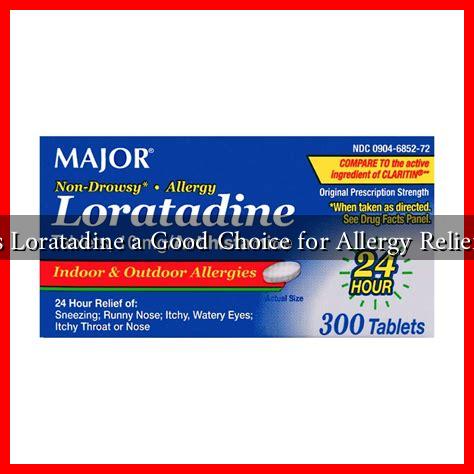-
Table of Contents
Is Loratadine a Good Choice for Allergy Relief?
Allergies affect millions of people worldwide, causing symptoms that can range from mild to debilitating. With a plethora of over-the-counter medications available, it can be challenging to determine which one is the most effective. Loratadine, a popular antihistamine, has gained attention for its efficacy in treating allergy symptoms. But is it the right choice for you? This article delves into the benefits, drawbacks, and overall effectiveness of Loratadine for allergy relief.
Understanding Loratadine
Loratadine is a second-generation antihistamine that is commonly used to alleviate symptoms associated with allergic rhinitis (hay fever) and chronic urticaria (hives). Unlike first-generation antihistamines, such as diphenhydramine (Benadryl), Loratadine is less likely to cause drowsiness, making it a preferred option for many individuals.
How Loratadine Works
Allergies occur when the immune system overreacts to allergens, releasing histamines that cause symptoms like sneezing, itching, and runny nose. Loratadine works by blocking the action of histamines at the H1 receptor sites, thereby reducing these symptoms. Its long-lasting effects make it suitable for once-daily dosing.
Benefits of Loratadine
There are several advantages to using Loratadine for allergy relief:
- Non-Drowsy Formula: One of the most significant benefits is its minimal sedative effects, allowing users to go about their daily activities without feeling drowsy.
- Long-Lasting Relief: Loratadine provides relief for up to 24 hours, making it convenient for those with persistent allergy symptoms.
- Wide Availability: It is available over-the-counter, making it easily accessible for those in need of quick relief.
- Minimal Side Effects: Compared to first-generation antihistamines, Loratadine has fewer side effects, making it a safer option for long-term use.
Potential Drawbacks
While Loratadine is effective for many, it may not be suitable for everyone. Some potential drawbacks include:
- Not Effective for All Symptoms: Loratadine primarily targets histamine-related symptoms and may not be as effective for nasal congestion caused by other factors.
- Possible Interactions: It can interact with certain medications, such as ketoconazole and erythromycin, which may increase the risk of side effects.
- Individual Variability: Some individuals may find that Loratadine does not provide adequate relief, necessitating a switch to other antihistamines or treatments.
Case Studies and Statistics
Research supports the effectiveness of Loratadine in managing allergy symptoms. A study published in the Journal of Allergy and Clinical Immunology found that Loratadine significantly reduced symptoms of allergic rhinitis compared to a placebo. In clinical trials, approximately 60-70% of participants reported substantial improvement in their symptoms after using Loratadine.
Moreover, a survey conducted by the American College of Allergy, Asthma & Immunology (ACAAI) indicated that 80% of allergy sufferers preferred non-drowsy antihistamines, with Loratadine being one of the most recommended options by healthcare professionals.
Conclusion
In summary, Loratadine is a well-researched and effective choice for allergy relief for many individuals. Its non-drowsy formula, long-lasting effects, and minimal side effects make it a popular option among allergy sufferers. However, it is essential to consider individual needs and consult with a healthcare provider to determine if Loratadine is the right choice for you. While it may not be effective for everyone, its benefits make it a valuable tool in managing allergy symptoms.
Ultimately, understanding your specific allergy triggers and treatment options can lead to better management of your symptoms and an improved quality of life.




